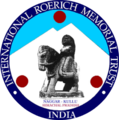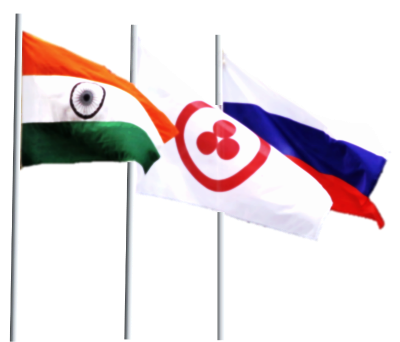15.04.2025
The Nicholas Roerich’s Memorial Workshop in Gungchel (Lahaul, HP, India) became the center of the Roerich Pact Day and Himachal Day celebrations
A celebratory event was held on 15 April to mark the 90th anniversary of the Roerich Pact and Himachal Pradesh State Day. The event took place in Gungshel (Lahaul, Himachal Pradesh), a location with a historical connection to the Urusvati Himalayan Research Institute (Naggar, Kullu). During the early 1930s, the research institute utilised Gungshel as its summer station.
The focus of the celebrations was the memorial workshop of Nicholas Roerich, the renowned Russian artist, scientist, thinker and traveller. He spent several summers in Lahaul in the early 1930s with his wife Helena Roerich, his sons and associates. This compact two-room cottage functioned as a base for both artistic endeavours and scientific research. Following extensive damage, the structure was restored in 2017. This initiative was led by the renowned Lahaul Buddhist scholar Tsering Dorje, Lama Nawang Upasak of Shashur Monastery and the Lahaul Roerich Society. The restoration work was carried out with the participation of specialists and local residents. The restoration of the memorial site was made possible by a grant from the Himachal Pradesh Government and the Lahaul District Administration, with significant support from the Russian Embassy in India.
The Lahaul Roerich Society, led by Lama Nawang Upasak and with the active involvement of Elena Bobrova, representative of the Altai cultural community, was a key initiator and organiser of the festival. The Guests of Honor were Sh Jagat Singh Negi, Minister of the Government of Himachal Pradesh, MLA Smt Anuradha Radha, Sh Manish Sharma, SDM Keylong, Smt Larisa Surgina, Russian Curator of the International Roerich Memorial Trust (Naggar, Kullu) and an employee of ICR (Moscow), and Sh Dmitry Surgin, Assistant to the Russian Curator. The participants included lamas and monks from Shashur and Kardong monasteries, representatives of the Lahaul administration and community, local residents, children, and creative groups.
The festival programme was inaugurated with a Buddhist prayer service for peace and prosperity. The programme then continued with speeches by the guests of honour. Minister Jagat Singh Negi emphasised the strong ties and increasing collaboration between Russia and India, and expressed his hope for further development of the cultural center here in Gungchel, based on the Nicholas Roerich’s Memorial Summer Workshop, which is becoming one of the main cultural attractions of Lahaul.
The programme for the festive day was very comprehensive, including archery and a bicycle race competitions, a children's drawing competition and prize-giving, demonstrations of video programmes dedicated to the Roerich Pact, and a cultural programme featuring traditional Lahaul dances. This event was attended by hundreds of people, who shared in a holiday full of joy and hope for the future prosperity of this historical place, which is associated with the names of the renowned Russian Roerich family.
To mark the holiday, a colourful exhibition of reproductions of Nicholas Roerich's paintings and archive photographs was opened in the Workshop. Elena Bobrova conducted an excursion around the exhibition for the guests and participants. Guests were invited to take photos near the Banner of Peace, which was located next to the entrance of the Workshop.
Larisa Surgina, Russian curator of the IRMT, conveyed greetings from the management and staff of the Roerichs Trust, as well as from Ms Torul Raveesh, Head of the Kullu District Administration and Director of the IRMT; from the Russian Embassy in India; from the management and staff of the International Centre of the Roerichs (Moscow); and from Sergei Yakovlev from Estonia. It was noted that the Lahaul Valley's inspiring beauty, its rich herbs, traditional medicine and spiritual culture, and the deepest knowledge stored in the monasteries were the reasons why the Roerichs established the summer station of the Urusvati Institute here.




























